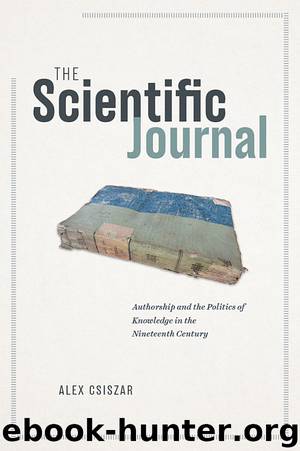The Scientific Journal by Alex Csiszar

Author:Alex Csiszar
Language: eng
Format: epub
Publisher: The University of Chicago Press
I should hardly call those scientific works; they are compilations; they are hardly works of discovery, but rather entertaining miscellanies. I am not aware of a single new fact or original idea that has been communicated in them . . . They impart some knowledge to those who have none, but they would never be taken in or consulted by men of science.3
The examiners continued to push. Did he intend to “limit the extent of the circulation of scientific works to men of science”? Taylor explained that this was not his point. Rather, there was an important generic distinction that corresponded to a distinction among men: “if there were no men of science to make discoveries there would be no science to communicate to the ignorant.”4 Taylor had in mind a specific notion of what constituted a scientific journal, and entertainment or education had nothing to do with it.
This chapter concerns the central paradox underlying the rise of the modern scientific journal: the idea that there is a well-defined publishing genre that is the locus of legitimate scientific exchange arose against the backdrop of an increasingly fluid and diverse—not to mention vast—landscape of print media trading in natural knowledge. Likewise, though the skills and competencies that were brought to bear in settings of scientific work never stopped expanding, one particular identity took on a special role in defining a life in science: periodical authorship. As journals came to be central to the scientific enterprise—not simply for communicating discoveries but as a means of generating a scientific reputation—a great deal of work was invested in setting bounds to this emerging institution of science.
Historians have shown that the ease with which Taylor claimed to distinguish between those publications that advanced knowledge by publishing original discoveries and those that popularized it obscures a less tidy reality. The diversity of genres and formats in which scientific views and information circulated in mid-century Britain and throughout Europe was breathtaking. Besides books and treatises aimed at a wide variety of readers, articles on scientific topics found their way into a vast array of serial genres, from quarterly reviews, to encyclopedias, to intellectual weeklies such as the Athenaeum and the Literary Gazette, and even satirical papers such as Punch. A similar diversity of print media and genre held elsewhere. In France, scientific reporting had continued in daily papers such as La Presse and the Journal des débats. These became the breeding ground for a new group of scientific writers who focused on popularization [vulgarisation] and made it their particular task to mediate between science and society by their pens. Many of them were also prolific writers of monographs on a vast array of scientific and technical topics. In Britain especially, the line between such specialized periodicals and the wider landscape of serial publishing remained porous. Whether a given publication was an original contribution to knowledge, an attempt to diffuse knowledge already established, or a sensational tract intended solely to generate profit was sometimes impossible to decide, especially given that it might be all of these things at once.
Download
This site does not store any files on its server. We only index and link to content provided by other sites. Please contact the content providers to delete copyright contents if any and email us, we'll remove relevant links or contents immediately.
Enlightenment Now: The Case for Reason, Science, Humanism, and Progress by Steven Pinker(7303)
A Journey Through Charms and Defence Against the Dark Arts (Harry Potter: A Journey Through…) by Pottermore Publishing(4796)
The Immortal Life of Henrietta Lacks by Rebecca Skloot(4570)
A Journey Through Divination and Astronomy by Publishing Pottermore(4373)
Elon Musk by Ashlee Vance(4118)
Origin Story: A Big History of Everything by David Christian(3679)
COSMOS by Carl Sagan(3616)
Alchemy and Alchemists by C. J. S. Thompson(3506)
Bad Pharma by Ben Goldacre(3417)
Enlightenment Now by Steven Pinker(3363)
Shadow of Night by Deborah Harkness(3352)
Inferior by Angela Saini(3308)
A Mind For Numbers: How to Excel at Math and Science (Even If You Flunked Algebra) by Barbara Oakley(3290)
Origin Story by David Christian(3191)
The Code Book by Simon Singh(3168)
Signature in the Cell: DNA and the Evidence for Intelligent Design by Stephen C. Meyer(3123)
The Elements by Theodore Gray(3048)
A Brief History of Time by Stephen Hawking(3015)
A Journey Through Potions and Herbology (A Journey Through…) by Pottermore Publishing(2843)
